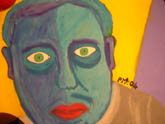

I understand the opera fades away, but then it's awfully hard to sustain the pitch of purely imaginative writing. I tried to learn some musical instruments, including some wind instruments. Music is something you make when you want to. And absolutely no theory is necessary. Listening to Nietzsche's musical arrangements, conceived when the philosopher tired of his work, some Sub-Schubertian but not stunningly original arrangements. I'm interested in Wagner's music-drama but also the earlier singspiele of Mozart's era. Of course Romanticism offers a wider range of responses than music of the Classical era which is tied down by an overwhelming need to work with the forms. And this is also a legacy of the Enlightenment foregrounding rationalism but also largely denied a range of responses called emotions that may, as Schopenhauer said, explain human motivations more profoundly than the intellect. I investigated Mendelsohn's music recently which again is fully blown Romanticism and thereby more emotive, powerful than the rational little tubes of paint/music laid down by the Mozartians who must have seemed as hippies do to us. Handel too, lived in Bond Street, London. I painted his harpsichord as the world-famous harpsichordist Lawrence Cummings played and a petit soprano sang an unknown (to me) oratorio. (Later Jimi Hendrix was an occupier of the same house. Hendrix extemporised as Handel had once done, but by then the vogue was for guitar lead breaks, addendums to the Baroque style. But the configuration Handel-Hendrix demonstrates how the world had moved on. A black man afforded the unaffordable address of the composer from Sachsen-Anhalt. Handel, born in Halle, Sachsen-Anhalt, today a soot-stained museum of Cold War memorabilia/pollution. Handel's Messiah, premiered in Dublin, though written in London, the interconnection of benign, civilizing Germans, later on, black hippies arriving on my own doorstep.) After Hendrix, Punk rock arrived, demonstrating that hard white men could still be angry, passed quickly. Then Techno, born in Berlin and probably doomed to die there. Personally I like the German Band Wolfsheim. My friend Martha from Bayern introduced me to them. They cast their shadow back to 80s groups like Gary Numan but also to Kraftwerk, a German techno group 'growing up' in the era of Punk, a British/US phenomenon. Perhaps there is a dichotomy between the slightly mechanical, technology tinged music of Kraftwerk and Punk rock as there had earlier been a division between Romantic and Classical eras.
In Muenchen donner und blitzen boomed like explosives, the first chords of Wagner's Tannhauser switched on to the mysterious non-switch of Alexander the Roth's radio. His own contribution, a painterly one, alone a mystery of itself, hidden behind his infamous nude women with beards sequence. Alas, an all too forgettable Ps to the development of that genre. At Schloss Neuschwanstein I lingered in Koenig Ludwig's once throne room, images all around from Wagner's Parsifal and indescribable sense of past pastness invoked intense nausea so I left. At Bayreuth I sat in Wagner's library at Villa Wahnfried, and listened to Lohengrin, then stood before the Grab of Cosima and he, a simple burial mound as Viking or Nordic as it looked.
Standing there made me realise how risky business history is, how even Saying 'the wrong thing' could influence the world, push everyone to the brink.
 Paul Murphy studied at the University of Warwick, gaining a BA in Film and Literature. From there he went to Queen's University Belfast to study for an MA on T.S. Eliot and the French philosopher Jacques Lacan. He is presently living in Berlin.
Paul Murphy studied at the University of Warwick, gaining a BA in Film and Literature. From there he went to Queen's University Belfast to study for an MA on T.S. Eliot and the French philosopher Jacques Lacan. He is presently living in Berlin.
His poetry, literary criticism, book reviews and travel writings have been published in journals worldwide. He has published two pamphlets and one book of poetry (In the Luxembourg Gardens, University of Salzburg Press, Austria), and a book on Eliot and Lacan (T.S. Eliot's Post-Modernist Complaint, Postpressed, Australia) and has read from his work throughout Europe.






















